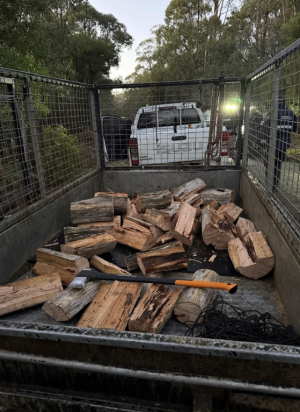New trend in national parks could lead to $9,800 fine if ignored
By
Gian T
- Replies 9
With colder weather settling in, plenty of people are looking to collect firewood to keep warm.
However, what feels like an innocent activity could come with serious consequences if not done legally. Authorities are warning that taking wood from certain areas could lead to fines of up to $9,800 or even imprisonment.
Many are surprised to learn that strict regulations are in place to protect local environments and wildlife.
Authorities across Australia are ramping up patrols and surveillance in national parks and reserves, warning that the illegal collection of firewood is a crime and a serious threat to our precious ecosystems.
This annual spike in offences during the colder months has prompted a renewed crackdown, with officers on the lookout for anyone tempted to take shortcuts to a warm winter’s night.
Just this week, two Victorians found themselves in hot water after being allegedly caught red-handed in Wandong Regional Park before dawn, loading freshly cut and split timber into a trailer.
In a swift response, police and officers from the Department of Energy, Environment, and Climate Action (DEECA) seized their trailer, chainsaws, block splitters, mobile phones, and the timber itself.
The matter is still under investigation, but the message is clear: authorities are taking this issue seriously, and the penalties are steep.
On-the-spot fines for breaching firewood collection rules start at $814, but more serious offences can attract penalties of up to $9,879 and even 12 months’ imprisonment.
And it’s not just your wallet at risk—officers can seize your equipment, including chainsaws, trailers, and even vehicles used in the offence.
It might seem harmless to take a few logs or branches, especially if they’re already on the ground.
But in reality, every piece of wood in our national parks plays a vital role in maintaining the ecosystem's health.
Fallen logs, branches, and leaf litter aren’t just 'waste'—they’re essential habitats and food sources for countless insects, fungi, mosses, and lichens.
These, in turn, support birds, reptiles, and small mammals, creating a delicate web of life.
Removing this material strips away shelter and breeding grounds, damages soil health, and disrupts the natural decomposition process that recycles nutrients back into the environment.
The impact on live trees is even more severe; it destroys habitat, disturbs native species, and breaks the forest's interconnected balance.
Tree roots help stabilise waterways and prevent erosion, so their removal can lead to sediment runoff and water pollution.
While the recent sting happened in Victoria, illegal firewood collection is a problem nationwide.
Government departments in Queensland and New South Wales have also issued warnings this month, urging people to respect the rules and protect our natural heritage.
Taskforce Ironbark, a Victorian initiative led by the Conservation Regulator in partnership with Parks Victoria, is at the forefront of the fight against firewood theft.
Manager Brady Childs explains that much of the illegal activity is driven by black market operators who know exactly what they’re doing.
The taskforce uses routine and targeted patrols, surveillance techniques, and community reports to catch offenders, focusing on known hotspots and working with other regulators both within Victoria and interstate.
'If you’re caught illegally harvesting timber from public land for commercial sale, you will be held accountable for the environmental damage, and risk facing prosecution and losing your equipment,' Childs warned.
In some states, there are designated firewood collection seasons and specific areas where you can legally collect wood for personal use.
These areas are carefully chosen to minimise environmental impact, and there are strict limits on how much you can take.
Always check with your local state or territory environment department before collecting firewood, and never assume it’s okay to take wood from national parks, reserves, or protected areas.
If you rely on wood for heating, consider sourcing your firewood from reputable suppliers who harvest from sustainable plantations or private land with the proper permits.
Many local councils and community groups also offer firewood for sale, often as part of fundraising efforts.
Not only will you stay on the right side of the law, but you’ll also help protect our unique wildlife and natural landscapes for future generations.
It’s easy to underestimate the impact of taking 'just a bit' of wood, but the cumulative effect can be devastating when thousands of people do the same.
Our national parks are carefully managed to preserve complex ecosystems that have taken decades—if not centuries—to develop.
Every fallen branch, rotting log, and standing tree plays a role in nutrient cycling, habitat provision, erosion control, and carbon storage.
Removing them undermines the very foundation of these fragile environments.
And remember, if you see suspicious activity in your local park or reserve, report it to the relevant authorities.
Together, we can help protect Australia’s natural treasures for generations to come. Stay warm, stay safe, and stay legal this winter!
 Have you ever been tempted to collect firewood from a national park, or do you have a favourite (legal!) source for your winter woodpile? Have you noticed changes in your local bushland or parks? We’d love to hear your thoughts and experiences—share your stories in the comments below.
Have you ever been tempted to collect firewood from a national park, or do you have a favourite (legal!) source for your winter woodpile? Have you noticed changes in your local bushland or parks? We’d love to hear your thoughts and experiences—share your stories in the comments below.
Read more: Simple mistake in national park lands two Aussies $9,000 fine
However, what feels like an innocent activity could come with serious consequences if not done legally. Authorities are warning that taking wood from certain areas could lead to fines of up to $9,800 or even imprisonment.
Many are surprised to learn that strict regulations are in place to protect local environments and wildlife.
Authorities across Australia are ramping up patrols and surveillance in national parks and reserves, warning that the illegal collection of firewood is a crime and a serious threat to our precious ecosystems.
This annual spike in offences during the colder months has prompted a renewed crackdown, with officers on the lookout for anyone tempted to take shortcuts to a warm winter’s night.
Just this week, two Victorians found themselves in hot water after being allegedly caught red-handed in Wandong Regional Park before dawn, loading freshly cut and split timber into a trailer.
In a swift response, police and officers from the Department of Energy, Environment, and Climate Action (DEECA) seized their trailer, chainsaws, block splitters, mobile phones, and the timber itself.
The matter is still under investigation, but the message is clear: authorities are taking this issue seriously, and the penalties are steep.
On-the-spot fines for breaching firewood collection rules start at $814, but more serious offences can attract penalties of up to $9,879 and even 12 months’ imprisonment.
And it’s not just your wallet at risk—officers can seize your equipment, including chainsaws, trailers, and even vehicles used in the offence.
It might seem harmless to take a few logs or branches, especially if they’re already on the ground.
But in reality, every piece of wood in our national parks plays a vital role in maintaining the ecosystem's health.
Fallen logs, branches, and leaf litter aren’t just 'waste'—they’re essential habitats and food sources for countless insects, fungi, mosses, and lichens.
These, in turn, support birds, reptiles, and small mammals, creating a delicate web of life.
Removing this material strips away shelter and breeding grounds, damages soil health, and disrupts the natural decomposition process that recycles nutrients back into the environment.
The impact on live trees is even more severe; it destroys habitat, disturbs native species, and breaks the forest's interconnected balance.
Tree roots help stabilise waterways and prevent erosion, so their removal can lead to sediment runoff and water pollution.
While the recent sting happened in Victoria, illegal firewood collection is a problem nationwide.
Government departments in Queensland and New South Wales have also issued warnings this month, urging people to respect the rules and protect our natural heritage.
Taskforce Ironbark, a Victorian initiative led by the Conservation Regulator in partnership with Parks Victoria, is at the forefront of the fight against firewood theft.
Manager Brady Childs explains that much of the illegal activity is driven by black market operators who know exactly what they’re doing.
The taskforce uses routine and targeted patrols, surveillance techniques, and community reports to catch offenders, focusing on known hotspots and working with other regulators both within Victoria and interstate.
'If you’re caught illegally harvesting timber from public land for commercial sale, you will be held accountable for the environmental damage, and risk facing prosecution and losing your equipment,' Childs warned.
In some states, there are designated firewood collection seasons and specific areas where you can legally collect wood for personal use.
These areas are carefully chosen to minimise environmental impact, and there are strict limits on how much you can take.
Always check with your local state or territory environment department before collecting firewood, and never assume it’s okay to take wood from national parks, reserves, or protected areas.
If you rely on wood for heating, consider sourcing your firewood from reputable suppliers who harvest from sustainable plantations or private land with the proper permits.
Many local councils and community groups also offer firewood for sale, often as part of fundraising efforts.
Not only will you stay on the right side of the law, but you’ll also help protect our unique wildlife and natural landscapes for future generations.
It’s easy to underestimate the impact of taking 'just a bit' of wood, but the cumulative effect can be devastating when thousands of people do the same.
Our national parks are carefully managed to preserve complex ecosystems that have taken decades—if not centuries—to develop.
Every fallen branch, rotting log, and standing tree plays a role in nutrient cycling, habitat provision, erosion control, and carbon storage.
Removing them undermines the very foundation of these fragile environments.
And remember, if you see suspicious activity in your local park or reserve, report it to the relevant authorities.
Together, we can help protect Australia’s natural treasures for generations to come. Stay warm, stay safe, and stay legal this winter!
Key Takeaways
- Cutting or collecting firewood from national parks is illegal across Australia, with offenders facing hefty on-the-spot fines starting from $814 and going up to $9,879, as well as possible imprisonment and confiscation of equipment.
- Victorian authorities have ramped up patrols, including overnight stings and the formation of Taskforce Ironbark, to tackle a winter spike in illegal firewood theft, particularly in known hotspots.
- Removing logs, branches, and leaf litter from national parks does significant environmental damage by destroying animal habitat, disrupting nutrient cycles, and increasing the risk of erosion and water pollution.
- Authorities are urging the public to respect national park rules, reminding everyone that fallen timber and vegetation are essential to the health and survival of native ecosystems and wildlife.
Read more: Simple mistake in national park lands two Aussies $9,000 fine








